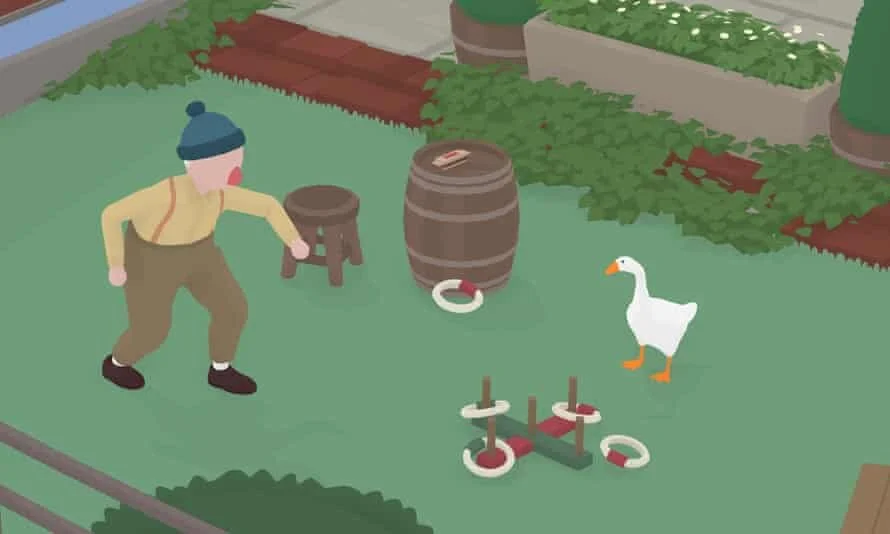How a Trailer Frames a Game
While browsing picture frames in a thrift store I found out I'm incredibly particular about frames. It was really hard to find a frame which fit the photos I had in mind. One might look too: rustic, shiny, tacky, cheap, fantastical, plain, or any other number of reasons.
When making a trailer, there are so many ways to "frame" a game; how you choose to do so says a lot about the game and sometimes it says a lot about you. In other words, the way you frame your game not only determines how other people perceive it, but it will frame their understanding of how YOU perceive it. This means the way you construct your game's trailer indicates what you think are its strongest selling points.
For example, if a trailer frames a game primarily via its features, quantities of content, and various game modes, that says to me: "These are the game's strongest selling points, and most worthy of attention." Problems with this arise when those things are not at all unique. That can lead to thoughts of "So... the strongest selling points of this game are things which TONS of other games have?"
Games aren't products like smart phones or 3D graphics cards with incrementally improving feature bullet points. In those cases it makes perfect sense to say the newer version has a higher quality camera system, more teraflops, more processor speed and better image fidelity. But I'm willing to bet when those things initially came out, the advertising focused on how life changing the experience would be. Base your trailer off of the first iPhone keynote, not the 10th.
So what are the various ways you can "frame" your game trailer and how will they affect how we see the game?
Don't sell your game like it's an iPhone X unless it's the ninth sequel.
How Music Frames the Game
Music is the most important part of a trailer because it's the quickest and most effective way to communicate feel, tone, genre and much more.
Trailer music is at its best when it has specificity or a bespoke quality to it. This is one reason I mostly like to work with the game's soundtrack or composer, because they've already been working towards that goal. Even very expensive and well made licensed trailer music can feel somewhat generic because the majority of it is made not knowing what it will be paired with (though a good music supervisor will do their best to match music to a game so it feels like they were made for each other).
When music doesn't match the visuals well, it can either fade into the background and become inconsequential, or it can be so generic it tells us the trailer maker or even the game doesn't have a unique thing to say. Similarly, using music for its "cool" factor can also make the game feel generic if it doesn't match.
To find the musical frame for your trailer ask:
Does the music set a specific mood?
Does the music put you in a specific setting?
Does the genre of music match the game's style?
Does the music's production value match the game's style?
Does the music's dramatic structure match the game's design?
What music would match this image? What music wouldn't?
How Voiceover Frames the Game
A bad voiceover can be incredibly off-putting in a way nothing else in a trailer can be. I frequently cite the Mighty No. 9 "Masterclass" Trailer because it's just such a huge miscalculation on so many levels, but its voiceover is the thing that seals the deal. If the trailer removed the voiceover entirely it wouldn't be very memorable, but at least it wouldn't make people hate the game.
Voiceover also has the power to frame a game in a very particular way because the sound, performance and direction of a voice will similarly put you in a specific space. This recent trailer for Gamedec struck me as a bit odd because the narrator sounds like a boxing announcer, but the setting is a Cyberpunk future.
I love the voiceover in this trailer for Monaco: What's Yours is Mine because the narrator here is ostensibly in-world and blends in naturally even though this voice isn't in the game at all. This is an example of finding the perfectly fitting frame.
To find the voiceover frame for your trailer ask yourself if the voice matches and/or enhances the:
Story
Setting
Genre
Tone
Emotion
What voice would match this shot? A boxing announcer might be amusing, but probably not a good match.
How Copy Frames the Game
"Copy" is the term for the text and title cards in a trailer. What matters are the words you choose to talk about the game AND what those words look like when they appear in the form of graphics. This comes down to messaging and graphic design.
Weak messaging frames a game as generic and predictable (e.g. "Multiple levels, Amazing boss battles, Unlockables and upgrades!"). Good messaging makes you think of one game and one game only (e.g. "Time moves when you move!" "Now you're thinking with portals." For more about messaging watch this GDC talk I did with my friend Dana Trebella.
By the same token, generic typography and graphics will also frame your game as having no identity kind of like the "cinematic" graphics from the trailer for this John Woo movie. Or even worse, flat, plain white graphics which came out of the default settings of the video editing software. On the other end of the spectrum are the graphics for Unbeatable's Kickstarter trailer which are just dripping with attitude and style.
To find the copy and graphical style for your trailer, ask:
Do these words belong specifically to this game?
Does this typeface match the feel, tone, genre and setting?
This copy and typography has TONS of personality
How Editing Frames the Game
The editing of the trailer can say a lot about the game too, but especially for inexperienced editors it might be completely inadvertent rather than a miscalculation. A common saying is that good editing is invisible, this is sort of true, but it's also incredibly useless as far as editing tips go. Good editing feels best when it matches its subject and content in energy, pace, rhythm, attitude, and a lot more.
For example, a slow paced and cozy game demands longer shots and fewer cuts like in this trailer for Unpacking. Fast editing and short shots can be frenetic and make you feel nervous, which is why it will generally be the wrong frame for a cozy game.
This goes the same for slow paced editing for a very fast game. This trailer for Bloodroots is great because the game itself is very very fast and this trailer makes you feel that with its quick cuts. Though with the right capture and direction a fast paced trailer can technically have longer shots but still feel fast like this trailer for My Friend Pedro which has long shots but a lot of action within each.
This is one simple example of how editing can frame a game, but more often the problems arise when the order shots appear in a trailer just don't make sense, and this is usually due to inexperience.
What pace of editing would match the vibe of this game?
I think the main way editing mis-frames a game is when the editor essentially thinks: "If I just show a bunch of random cool stuff (without considering of the order) they'll figure it out." This is the editing equivalent of doing a music search for "Epic" and picking the first result or just using a typical movie trailer narrator for the game. It might be even worse than that, because it's like throwing the game out to the public buck naked or creating a dating profile for someone by selecting random photos and tweets.
A cut which feels random versus one which feels guided and natural will probably affect the audience on a more subconscious level. Imagine the trailer is a magical drink where you get to decide what order the drinker experiences each flavor. A poorly edited trailer would result in something like a drink where one moment it's sour, then it tastes like milk chocolate, suddenly it's umami, then it's chewy, then slimy, etc. A well edited trailer finds a way to take all the flavors and textures and put them in an order where it goes down smoothly.
Unfortunately, bad editing is much more subtle than a mishmash of drink flavors, but the result is that the viewer comes out knowing less about the game and being confused rather than curious. Or even worse, what they think they know about the game is entirely wrong whether it's genre, game mechanics, or story.
It's much more difficult to find the right frame via the editing because I think people have more experience sampling and forming opinions about music and voices than editing styles. Also, when selecting music and voices you're choosing work made by other professionals. When you're the trailer maker, the editing is up to you (unless you're a creative director working with a professional editor.)
To find the editing style which frames the game, consider:
Does the pace and cutting speed match the energy of the game?
What style of editing would match the pace of this game?
How Direction Frames the Game
The direction of the trailer is the high level frame; it's all the pieces put together. If you put the trailer in the wrong direction, everything else is likely to follow. There are so many ways to direct a trailer but the big divide I usually see are trailers which either put features first, or the overall experience first.
Again, a trailer for a game which puts its features and bullet points first is like a new physical product coming out describing itself like the 10th iPhone before we even know what it is or what problem it's solving. This is the reason I keep coming back to this in so many of my posts because it's the easiest way to frame a game, but also one of the least effective. This is framing a game by its least unique qualities as if they're its best. It's like saying "Try my ice cream; it's cold!"
How hard the trailer tries to sell a game is also a part of direction which frequently goes hand in hand with a lot of title cards. This makes the game look worse because you're framing the game as in need of a pushy salesperson. In contrast, a trailer which shows the experience first can frame the game as confident and strong enough to speak for itself. The less you let your game speak for itself, the less people will think it is good enough to speak for itself.
When trying to find the creative direction frame for your game ask:
What am I highlighting as the game's strengths?
How am I highlighting the game's strengths?
Am I presenting the game from a position of insecurity or pride?
Am I making a hard sell or a soft sell?
When I first started this post I didn't realize I'd basically be walking through nearly every component of a game trailer, but that just goes to show how everything matters and affects how successful the trailer will be.






